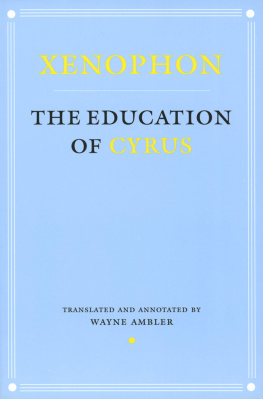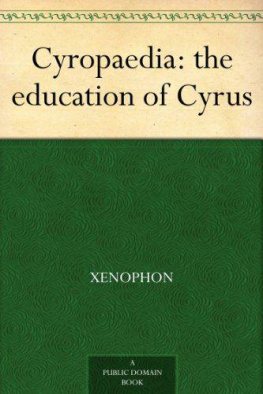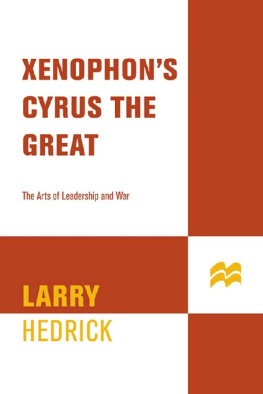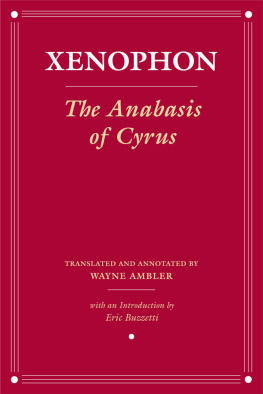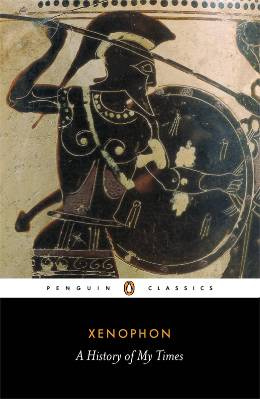Acknowledgments
The following study is to some extent the result of a long interest in ancient leadership and the emotions. Thus I owe a debt of gratitude to many more friends and mentors than I have space to mention here, including to Dick Gerberding, who converted me to Classics from a budding career in physics, and to Stephen Sandridge, who from my early adolescence showed a Cambyses-like patience and generosity toward my persistent and sometimes forward questions about the character and behavior of otherseven his own.
But for the composition of this book I must recognize the friendship and support of my colleagues at Howard University, who over the past several years either read the manuscript in its entirety or listened to my ideas and gave helpful feedback: Matt Amati, David Carlisle, John Chesley, Caroline Dexter, Rudolph Hock, Molly Levine, Arti Mehta, Lee Patterson. I am also grateful to my many colleagues in the field who read drafts, listened to presentations, engaged in dialogue, and challenged me to see Xenophons Cyrus from perspectives entirely new to me: Emily Baragwanath, Jeff Beneker, Angelos Chaniotis, Sarah Ferrario, Johannes Haubold, David Konstan, Patrick Miller, Bill Race, Claire Taylor. Thanks are also due to Dan Joseph and Robin Olson, whose copy-edits significantly improved the style, clarity, and concision of this manuscript. This book is far better for their insights and suggestions, but I am fully responsible for any and all of the ways in which a scholarly work might be flawed.
I also wish to thank Harvard Universitys Center for Hellenic Studies in Washington, DC for a fellowship that afforded me the opportunity to compose this book in the recreational beauty of its library and grounds. I thank especially the director of the Center, Gregory Nagy, for his infectious ebullience and unwavering encouragement. I thank also the library staff for their expert and friendly help in navigating the librarys world-class resources: Erika Bainbridge, Sophie Boisseau, Temple Wright.
Thanks are due to Jill Curry Robbins for her timely and efficient guidance through every stage of the publication process, including her expertise in art history, which helped me select what I believe is a cover image rich in color and meaning.
Finally, I dedicate this book to my wife Kimberly Judge Sandridge. It would be embarrassing and out of place for me to explain the reasons. Suffice it to say that in this life Ive seen everything I can see, but Ive never seen nothing like her.
Chapter 1. Philanthrpia and Philotmia as Reciprocal Fondness
I begin this study of Cyrus three superlative character traits with an early and seemingly simple passage in the Cyropaedia. Xenophon describes how the twelve-year-old Cyrus wins over his Medan contemporaries (hlikotai), then their fathers, and then his grandfather, Astyages. Both the love of humanity (philanthrpia) and the love of being honored (philotmia) explain Cyrus behavior. As we proceed through this passage piece by piece, we will see how thoroughly interwoven Xenophons entire narrative is and how he is either reworking or incorporating aspects of the Cyrus legend from Herodotus and Ctesias. [ It is also possible that Xenophon is either inventing aspects of Cyrus on his own or that he is drawing from non-extant Persian folklore. Of particular interest for us will be the ways in which Cyrus comes to form intimate relationships. We will examine his fondness for others, his affection, his ways of showing favor, his gentleness, his sense of fairness, his sympathy, his pity, his nurturing attention, his ability to play matchmaker, his practice of giving giftsall of which serve to win honor and a devoted following.
The scene is set by the departure of Cyrus mother, Mandane, from the Medan court of Astyages back to Persia. After expressing concern for the kind of education Cyrus would receive in a decadent and despotic Media, she leaves Cyrus behind. He must rely on his own Persian education, which is tested in several ways. Xenophon describes how Cyrus quickly comes to be on familiar terms with his Medan contemporaries and disarms their fathers. He then wins over Astyages and uses his favor to help the fathers.
, , , , , , , , . , , , .
Quickly he had blended in with his age-mates so much that they were like family. Quickly he won over their fathers by approaching them and making it clear that he favored their sons; the result was that if they needed anything from the king, they would tell their sons to ask Cyrus to accomplish it for them. And Cyrus, because of hisphilanthrpiaandphilotmia , made it a priority to accomplish whatever they asked of him. And Astyages could not resist favoring Cyrus in whatever he asked for. For when he was sick, Cyrus never left his grandfather and never stopped weeping, but made it clear to everyone that he feared his grandfather might die. For if Astyages needed something even at night, Cyrus was first to notice it and with the least hesitation of all would jump up to help in whatever way he thought would be pleasing, so that he won over Astyages entirely.
Cyropaedia 1.4.12
As we think about this scene, we should keep in mind how Herodotus Cyrus interacts with his Medan contemporaries and their fathers (Histories 1.114116). Herodotus Cyrus is ten years old and, up to this point, raised in the company of herdsmen who have rescued him from exposure (he does not yet know of his royal blood). He plays at being king with the Medan youth, but when it is his turn to be king he assigns various tasks, then has one of the boys whipped for refusing to obey. As the boy is seemingly of a higher station than Cyrus, the boys father, Artembares, has Cyrus brought before Astyages to be punished for his outrage. Astyages then realizes that Cyrus is the grandson he had tried to have killed as an infant (because he feared his rise to power). Both Xenophon and Herodotus Cyrus play at being king but in rather different ways. Xenophons Cyrus imagines being ruler (archn) of Astyages wine-pourer Sacas, but in a lighthearted and ultimately harmless manner (Cyropaedia 1.3.11).
Blending In
Unlike Herodotus Cyrus, Xenophon says that Cyrus blended in so well with his Medan contemporaries that he comes to be on familiar terms with them. Other uses of the expression oikeisdiakeisthai refer to those whose interests and routines are thoroughly intertwined, e.g. by dining together, traveling together, or sharing in any activity with a member of a household (oikos) without technically belonging to it. [
After mentioning his quick intimacy with the Medan youth, Xenophon gives specific examples of how Cyrus manages to blend in with them so well. He attributes none of Cyrus familiarity to his half-Medan ancestry but instead portrays what in other contexts is called Cyrus mildness or gentleness (praots). [ With false bravado Cyrus challenges his contemporaries to riding contests, even though he knows he is inferior. When he fails, he is quick to laugh at himself (1.4.4). When he goes hunting with his comrades, he declines the privilege of being the first to cast his spear, but insists instead that his comrades be allowed to hunt with him on equal terms (1.4.14). When the hunt begins, Cyrus even cheers his comrades in pursuit of their quarry. His grandfather delights in the fact that Cyrus does not feel any envy toward them. Instead Cyrus is a source of pleasure to all and of grief to none (1.4.15).
Cyrus friendly competitiveness contrasts sharply with the envy of the Assyrian king in the Cyropaedia, who not only murders the son of Gobryas when he bests him in the hunt, but makes Gadatas into a eunuch when he catches the eye of one of his concubines. [ Xenophons Cyrus apparently has no need for such a privilege.


